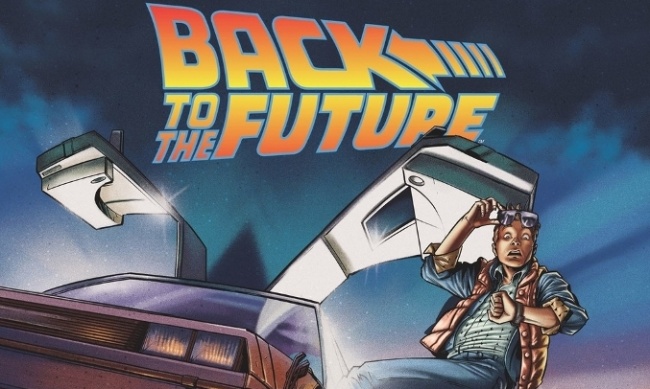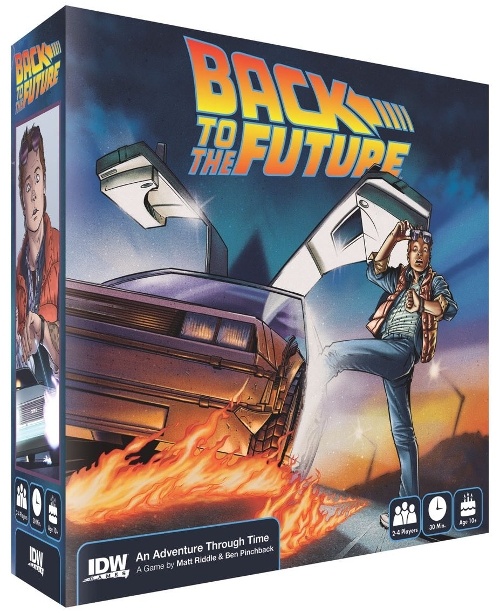Back to the Future: An Adventure Through Time
Publisher: IDW Games
Release Date: April 2016
Price: $34.99
Game Designer: Matt Riddle and Ben Pinchback
Format: Board/Card game
Number of players: 2-4
Game Length: 45 minutes
Product #: 00927IDW
Age Rating: 10+
ICv2 Rating: 4 stars out of five
The basic concept of the game is that you have to complete a series of sets of cards in three different time periods. What makes the game tricky is that each time period has its own rules. Also, your own rules change every turn, based on which viewpoint character you are playing on that particular turn. That can be a little confusing at first, but players will get the hang of it over "time."
What you are trying to do is to gather characters in the right year to fulfill goals. For instance, you might need to get Biff, George and Lorraine all together in 1955 so that George can punch Biff. However, if what you have in your hand is Biff from 2015, Lorraine from 1985 and George from 1955, well, that won’t work. So you need to work through the deck to draw the right cards, spend cards to move back and forth in time via DeLorean, and then play the right cards at the right time… only to find out that someone else has gotten there first, and you really have a new set of 1955 goals.
Character cards are a little complicated at first, because the designers went for thematic icons rather than numbers for both the cost to play a card and the value of a card when used to help pay for other things. So, reading a flux capacitor charging display is a skill that players will need to acquire.
Each turn, you choose your viewpoint character role. Doc can move the DeLorean more easily, Marty can play cards more easily, and Biff is a bully and can steal a card from someone else. Lorraine, George and Jennifer have their own special abilities. While they may not be perfectly balanced, over the course of the game you will play different characters, so you will not be stuck with a circumstantially weak character for long.
The components are of high quality, but the artwork includes some frankly strange facial expressions. For your money, you get a really great box, but not all that many components. The components were designed to fit in a bigger box than was strictly necessary. Once they are punched out, only the rule book would not have fit into a much smaller container.
The game lasts until most of the goals have been claimed, and the winner is the one with the most points. Goals make up most of the points, but there are other, smaller point sources, and these can decide a close game.
While the listed playing time of 45 minutes may be a tad optimistic, the game plays smoothly and easily, so even in games which run longer, there is no feeling that it’s going on for TOO long.
The rules for 1955 slow things down whenever one or more players is trying to do things in that time period, but not too badly. Going backwards in time is more costly in terms of your limited resources, and also gives you less of an opportunity to replenish those same limited resources. As a result, you will want to gather the resources in 1985 or 2015 that you will need to spend in 1955, but it rarely works that smoothly.
Playing the "B" side of the event cards gives a different set of effects for things as events resolve, and can be used to make the game more interesting, but also a little stranger. Play the "A" side a couple of times first, in order to learn the mechanics.
The only thing that our players had on their "wish list" for the game was more different event cards, because there are very few different goals currently in the game.
--Nick Smith: Librarian Technician, Community Services, for the Pasadena Public Library in California.

ICv2 Stars: 4 (out of 5)
Posted by Nick Smith on July 15, 2016 @ 2:14 am CT



